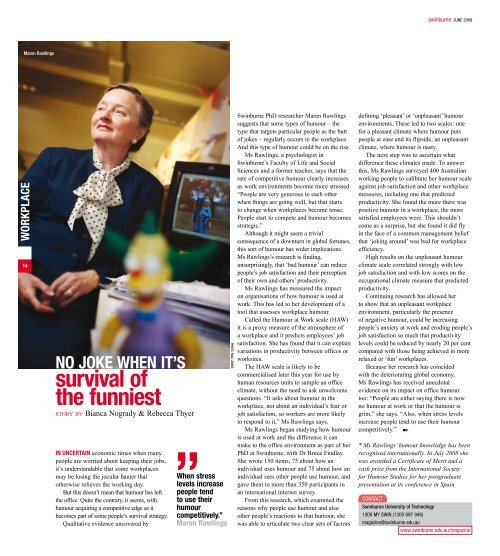View PDF - Swinburne University of Technology
View PDF - Swinburne University of Technology
View PDF - Swinburne University of Technology
Create successful ePaper yourself
Turn your PDF publications into a flip-book with our unique Google optimized e-Paper software.
swinburne JUne 2009<br />
Maren Rawlings<br />
workplace<br />
14<br />
No joke when it’s<br />
survival <strong>of</strong><br />
the funniest<br />
story by Bianca Nogrady & Rebecca Thyer<br />
In uncertain economic times when many<br />
people are worried about keeping their jobs,<br />
it’s understandable that some workplaces<br />
may be losing the jocular banter that<br />
otherwise relieves the working day.<br />
But this doesn’t mean that humour has left<br />
the <strong>of</strong>fice. Quite the contrary, it seems, with<br />
humour acquiring a competitive edge as it<br />
becomes part <strong>of</strong> some people’s survival strategy.<br />
Qualitative evidence uncovered by<br />
,,<br />
When stress<br />
levels increase<br />
people tend<br />
to use their<br />
humour<br />
competitively.”<br />
Maren Rawlings<br />
photo: paul Jones<br />
<strong>Swinburne</strong> PhD researcher Maren Rawlings<br />
suggests that some types <strong>of</strong> humour – the<br />
type that targets particular people as the butt<br />
<strong>of</strong> jokes – regularly occurs in the workplace.<br />
And this type <strong>of</strong> humour could be on the rise.<br />
Ms Rawlings, a psychologist in<br />
<strong>Swinburne</strong>’s Faculty <strong>of</strong> Life and Social<br />
Sciences and a former teacher, says that the<br />
rate <strong>of</strong> competitive humour clearly increases<br />
as work environments become more stressed.<br />
“People are very generous to each other<br />
when things are going well, but that starts<br />
to change when workplaces become tense.<br />
People start to compete and humour becomes<br />
strategic.”<br />
Although it might seem a trivial<br />
consequence <strong>of</strong> a downturn in global fortunes,<br />
this sort <strong>of</strong> humour has wider implications.<br />
Ms Rawlings’s research is finding,<br />
unsurprisingly, that ‘bad humour’ can reduce<br />
people’s job satisfaction and their perception<br />
<strong>of</strong> their own and others’ productivity.<br />
Ms Rawlings has measured the impact<br />
on organisations <strong>of</strong> how humour is used at<br />
work. This has led to her development <strong>of</strong> a<br />
tool that assesses workplace humour.<br />
Called the Humour at Work scale (HAW)<br />
it is a proxy measure <strong>of</strong> the atmosphere <strong>of</strong><br />
a workplace and it predicts employees’ job<br />
satisfaction. She has found that it can explain<br />
variations in productivity between <strong>of</strong>fices or<br />
worksites.<br />
The HAW scale is likely to be<br />
commercialised later this year for use by<br />
human resources units to sample an <strong>of</strong>fice<br />
climate, without the need to ask unwelcome<br />
questions. “It asks about humour in the<br />
workplace, not about an individual’s fear or<br />
job satisfaction, so workers are more likely<br />
to respond to it,” Ms Rawlings says.<br />
Ms Rawlings began studying how humour<br />
is used at work and the difference it can<br />
make to the <strong>of</strong>fice environment as part <strong>of</strong> her<br />
PhD at <strong>Swinburne</strong>, with Dr Bruce Findlay.<br />
She wrote 150 items, 75 about how an<br />
individual uses humour and 75 about how an<br />
individual sees other people use humour, and<br />
gave them to more than 350 participants in<br />
an international internet survey.<br />
From this research, which examined the<br />
reasons why people use humour and also<br />
other people’s reactions to that humour, she<br />
was able to articulate two clear sets <strong>of</strong> factors<br />
defining ‘pleasant’ or ‘unpleasant’ humour<br />
environments. These led to two scales: one<br />
for a pleasant climate where humour puts<br />
people at ease and its flipside, an unpleasant<br />
climate, where humour is nasty.<br />
The next step was to ascertain what<br />
difference these climates made. To answer<br />
this, Ms Rawlings surveyed 400 Australian<br />
working people to calibrate her humour scale<br />
against job satisfaction and other workplace<br />
measures, including one that predicted<br />
productivity. She found the more there was<br />
positive humour in a workplace, the more<br />
satisfied employees were. This shouldn’t<br />
come as a surprise, but she found it did fly<br />
in the face <strong>of</strong> a common management belief<br />
that ‘joking around’ was bad for workplace<br />
efficiency.<br />
High results on the unpleasant humour<br />
climate scale correlated strongly with low<br />
job satisfaction and with low scores on the<br />
occupational climate measure that predicted<br />
productivity.<br />
Continuing research has allowed her<br />
to show that an unpleasant workplace<br />
environment, particularly the presence<br />
<strong>of</strong> negative humour, could be increasing<br />
people’s anxiety at work and eroding people’s<br />
job satisfaction so much that productivity<br />
levels could be reduced by nearly 20 per cent<br />
compared with those being achieved in more<br />
relaxed or ‘fun’ workplaces.<br />
Because her research has coincided<br />
with the deteriorating global economy,<br />
Ms Rawlings has received anecdotal<br />
evidence on its impact on <strong>of</strong>fice humour<br />
too: “People are either saying there is now<br />
no humour at work or that the humour is<br />
grim,” she says. “Also, when stress levels<br />
increase people tend to use their humour<br />
competitively.” ••<br />
* Ms Rawlings’ humour knowledge has been<br />
recognised internationally. In July 2008 she<br />
was awarded a Certificate <strong>of</strong> Merit and a<br />
cash prize from the International Society<br />
for Humour Studies for her postgraduate<br />
presentation at its conference in Spain.<br />
Contact. .<br />
<strong>Swinburne</strong> <strong>University</strong> <strong>of</strong> <strong>Technology</strong><br />
1300 MY SWIN (1300 697 946)<br />
magazine@swinburne.edu.au<br />
www.swinburne.edu.au/magazine

















